 W
WVizeadmiral Lothar von Arnauld de la Perière, born in Posen and of French-German descent, was a German U-boat commander during World War I. With 194 ships and 453,716 gross register tons (GRT) sunk, he is the most successful submarine captain ever. His victories came in the Mediterranean, almost always using his 8.8-cm deck gun. During his career he fired 74 torpedoes, hitting 39 times.
 W
WWilhelm Franz Canaris was a German admiral and chief of the Abwehr, the German military intelligence service, from 1935 to 1944. He was initially a supporter of Adolf Hitler but by 1939 had turned against the regime.
 W
WRolf Hans Wilhelm Karl Carls was a high-ranking German admiral during World War II. He was a recipient of the Knight's Cross of the Iron Cross of Nazi Germany.
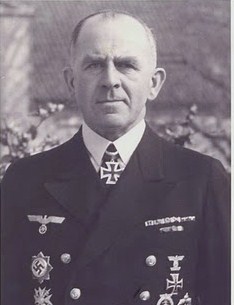 W
WOtto Ciliax was a German naval officer who served in the navies of the German Empire, the Weimar Republic and Nazi Germany. As an admiral during World War II, he commanded the German battleships. He was a recipient of the Knight's Cross of the Iron Cross.
 W
WKarl Dönitz was a German admiral during the Nazi era who briefly succeeded Adolf Hitler as the German head of state in May 1945, until Germany's unconditional surrender to the allies in the same month. As Supreme Commander of the Navy beginning in 1943, he played a major role in the naval history of World War II. He was convicted of war crimes at the Nuremberg trials in 1946.
 W
WWalther Forstmann was one of the most successful and highly decorated U-boat commanders in the Kaiserliche Marine during World War I. He also served in the Kriegsmarine during World War II in different staff positions.
 W
WHeino von Heimburg was a German U-boat commander in the Kaiserliche Marine during World War I and served also as Vizeadmiral in the Kriegsmarine during World War II.
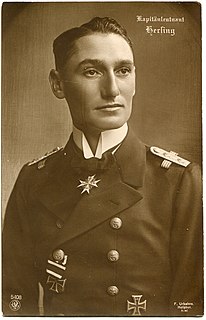 W
WOtto Hersing was a German naval officer who served as U-boat commander in the Kaiserliche Marine and the k.u.k. Kriegsmarine during World War I.
 W
WHans Howaldt was a successful and highly decorated German U-boat commander in the Kaiserliche Marine during World War I and also active in World War II. By the end of World War I he was promoted Kapitänleutnant.
 W
WPaul Liebrecht König was a sailor and business executive. The son of a clergyman, married to an English wife from whom he separated for the duration of the war, he is most known for two visits he made to the United States in 1916 as captain of the merchant submarine U-Deutschland.
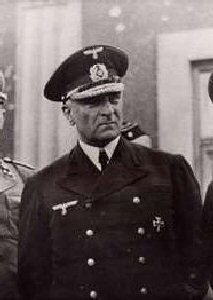 W
WFriedrich Lützow was a German naval officer who served in the Kaiserliche Marine, the Reichsmarine and the Kriegsmarine, eventually reaching the rank of Vizeadmiral during World War II. He was also a writer on naval warfare.
 W
WErhard Maertens or Eberhard Maertens was a German Vizeadmiral of the Kriegsmarine during World War II. From 16 June 1941 to 5 May 1943, he was Chief of Office of Naval Intelligence, Naval War Command in the Oberkommando der Marine. Maertens was known for underestimating British intelligence, and specifically, overrating the security of the Naval Enigma cipher machine. In 1941, he held a naval enquiry into the strength of Naval Enigma security after the capture of U-boat U-570, and attributed all the suspicious losses in U-boats at the time to the British Huff-Duff. In the second enquiry, ordered by the Commander-in-Chief of the Navy Karl Dönitz, in May 1943, he investigated a number of areas, which exculpated Enigma security in the end, for the second time, incorrectly blaming British 9.7 centimetre centimetric radar for the massive losses in U-boats by mid 1943.
 W
WWilhelm Marschall was a German admiral during World War II. He was also a recipient of the Pour le Mérite which he received as commander of the German U-boat UB-105 during World War I. The Pour le Mérite was the Kingdom of Prussia's highest military order for German officers until the end of World War I.
 W
WFriedrich Gustav Emil Martin Niemöller was a German theologian and Lutheran pastor. He is best known for his opposition to the Nazi regime during the late 1930s and for his widely quoted 1946 poem "First they came ...". The poem exists in many versions; the one featured on the United States Holocaust Memorial reads: “First they came for the Communists, and I did not speak out—Because I was not a communist. Then they came for the trade unionists, and I did not speak out—Because I was not a trade unionist. Then they came for the Jews, and I did not speak out—Because I was not a Jew. Then they came for me—and there was no one left to speak for me.”
 W
WHans Rose was one of the most successful and highly decorated German U-boat commander in the Kaiserliche Marine during World War I. He sank 79 ships for a total of 213,987 gross register tons (GRT) during the war.
 W
WAlfred Saalwächter was a high-ranking German U-boat commander during World War I and General Admiral during World War II.
 W
WOberleutnant zur See Reinhold Saltzwedel was a successful and highly decorated German U-boat commander in the Kaiserliche Marine during World War I.
 W
WOtto von Schrader was a German admiral during World War II and a recipient of the Knight's Cross of the Iron Cross of Nazi Germany. As a U-boat commander during World War I, he was credited with the sinking of 57 ships for a total of 54,655 gross register tons (GRT), a further 6 ships damaged for a total of 52,333 GRT, including SS Justicia, and one ship taken as prize for a total of 336 GRT. Schrader was taken prisoner of war in Norway at the end of World War II. He committed suicide in Norwegian captivity on 19 July 1945.
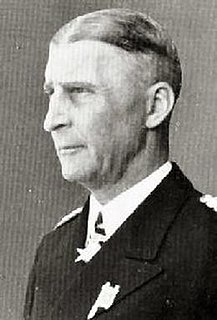 W
WOtto Schultze was a Generaladmiral with the Kriegsmarine during World War II and a recipient of the Pour le Mérite during World War I. The Pour le Mérite was the Kingdom of Prussia's highest military order for German soldiers until the end of World War I. As a U-boat commander during World War I, he was credited with the sinking of 53 merchant ships for a total of 132,567 gross register tons, and HMS Falmouth of 5,275 long tons (5,360 t) displacement.
 W
WKapitänleutnant Walther Schwieger was a U-boat commander in the Imperial German Navy during First World War. In 1915, he sank the passenger liner RMS Lusitania with the loss of 1,198 lives.
 W
WOtto Steinbrinck was a highly decorated World War I Naval Officer and German industrialist, who was later indicted and found guilty in the Nuremberg Flick Trial.
 W
WGeorg Ludwig Ritter von Trapp was an Austrian naval officer who later acquired U.S. citizenship. He was the patriarch of the Trapp Family Singers, whose lives were the inspiration for the musical play and film The Sound of Music. His naval exploits during World War I earned him numerous decorations, including the Military Order of Maria Theresa. Under his command, the submarines SM U-5 and SM U-14 sank 13 Allied ships totaling about 45,669 gross register tons (GRT).
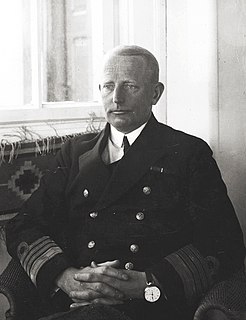 W
WJózef Unrug was a Polish admiral who helped reestablish Poland's navy after World War I. During the opening stages of World War II, he served as the Polish Navy's commander-in-chief. As a German POW, he refused all German offers to change sides and was incarcerated in several Oflags, including Colditz Castle. He stayed in exile after the war in the United Kingdom, Morocco and France where he died and was buried. In September 2018 he was posthumously promoted in the rank of Admiral of the fleet by the President of Poland. After 45 years his remains, along with those of his wife Zofia, were exhumed from Montrésor and taken in October 2018 to his final resting place in Gdynia, Poland.
 W
WCaptain Christian August Max Ahlmann Valentiner was a German U-boat commander during World War I. He was the third highest-scoring U-boat commander of the war, and was awarded the Pour le Mérite for his achievements.
 W
WWalter Wilhelm Julius Warzecha was a German naval commander and high-ranking officer of the Kriegsmarine. Serving in the rank of General Admiral he succeeded General Admiral Hans-Georg von Friedeburg as the last Oberbefehlshaber der Kriegsmarine after the end of World War II.
 W
WOtto Eduard Weddigen was a German imperial navy U-boat commander during World War I.